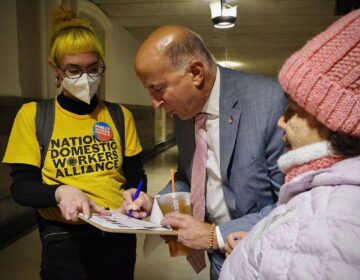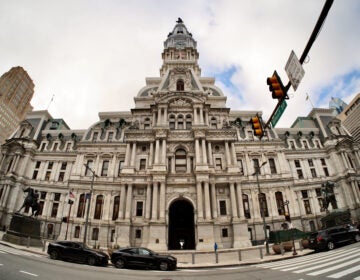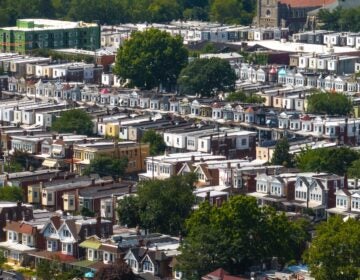Philadelphia City Council considers expanded protection bill for domestic workers
There’s already a bill of rights for domestic workers on the books in Philadelphia, but organizers say it’s difficult to enforce it without an anti-retaliation measure.
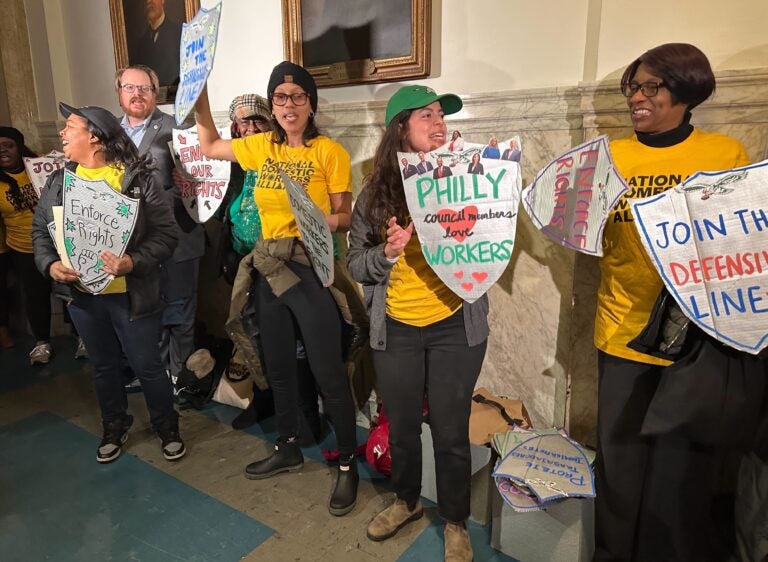
Local organizers with the National Domestic Workers Alliance Pennsylvania chapter and the Philly Black Worker Project rally inside City Hall to promote the introduction of legislation that would increase worker protections. (Kristen Mosbrucker-Garza/WHYY)
Have a question about Philly’s neighborhoods or the systems that shape them? PlanPhilly reporters want to hear from you! Ask us a question or send us a story idea you think we should cover.
Domestic workers in Philadelphia are poised to receive more legal protections on the job — often inside of their employers’ homes — if a new bill in City Council is successful. The new measures are an expansion of existing worker-protection laws on the books, giving the city more teeth in its enforcement.
Philadelphia Councilmember and Minority Leader Kendra Brooks introduced the legislation on Thursday, known as the POWER Act, which is referred to the City Council Committee on Labor and Civil Service.
“Our labor laws are meaningless if we don’t have the tools to enforce them, and the POWER Act is a vital next step to continue the progress we’ve made to protect workers in our city,” said Councilmember Kendra Brooks in a press release.
In 2019, Philadelphia City Council passed an ordinance that prohibits employers from discrimination in hiring practices, requires written contracts with job duties and an hourly wage and requires meal and rest breaks, as well as sick time and paid leave. The law took effect in May 2020.
Employers face a $2,000 fine for each violation.
Domestic workers can even earn paid time off through a portable benefits system, which is collected as an extra fee from clients then added to a prepaid VISA card.
Domestic workers are excluded from the Civil Rights Act, the Occupational Safety and Health Act and the National Labor Relations Act. That means they can’t unionize, file complaints with OSHA over workplace safety or have anti-discrimination protections under federal law.
While Philadelphia is one of the few cities across the nation to even have protections for domestic workers, organizers say it’s still difficult to hold employers accountable.
Abena Ruiz immigrated from Trinidad about two decades ago and raises children as a nanny in Philadelphia. Ruiz said the industry is rife with labor law violations.
“I’ve seen it all. And I’ve heard it all. There was a lot of injustices,” Ruiz said.
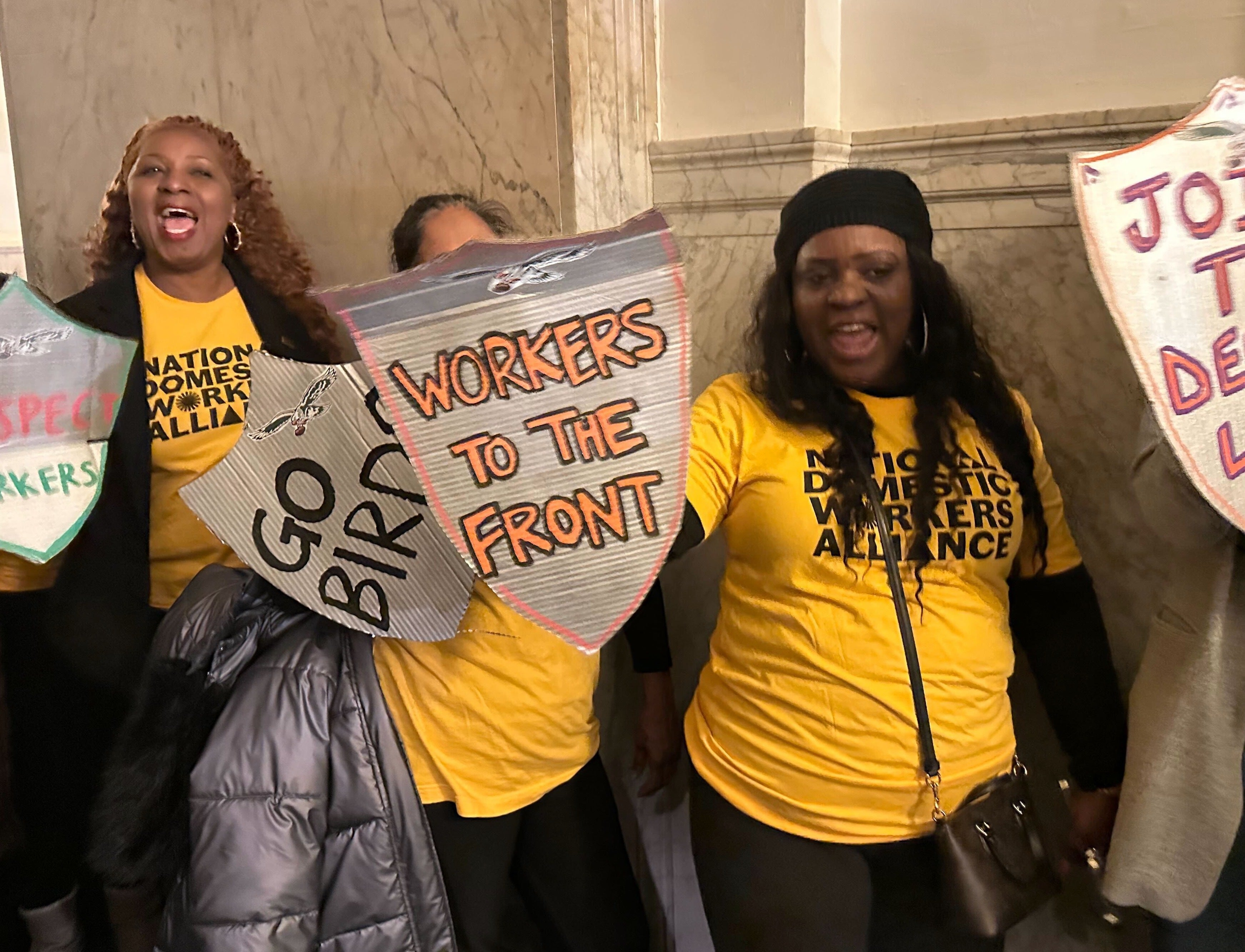
Often workers struggle to get paid by families, take breaks or get a written contract despite working long hours, sometimes inside their employer’s homes.
Rufina Rodriguez worked as a house cleaner for 10 years before becoming a labor organizer.
Rodriguez said, in Spanish, employers often take advantage of them.
“Los tipos de abusos que siempre estan in las cancelaciones, siempre los, les pagan tarde, el robo de salario,” dijo Rodriguez.
“The types of abuses are when [employers] cancel last-minute, always pay late or commit wage theft,” she said.
Now, she’s helping workers assert their rights already enshrined in city law, but many workers fear retaliation if they speak out.
“Despite these laws, workers have identified challenges regarding enforcement and accountability for employers who continually violate their rights,” said Daniela Perez, spokesperson for the National Domestic Workers Alliance. “These bad actors take workers’ wages, deny sick time and rest breaks, and retaliate against those who stand up for their rights.”
The POWER Act enables the Philadelphia Department of Labor to investigate employers accused of abuse, suspend licenses and procurement contracts for violators and subpoena records in workers’ rights court cases.
It will also permit the city to pay workers directly damages for labor law violations. It will require written receipt of complaints, status updates and a clear appeals process for workers. The city would also create standards for a bad actors database with repeat offenders and create guidelines for the city to certify immigration protections.
The bill also recalculates sick pay for tipped workers, aiming to lower the financial burden of taking time off. And it makes changes to the portable benefits system, allowing for damages when employers violate meal breaks, rest breaks and written contracts.
The legislation is cosponsored by Councilmembers Jim Harrity, Mark Squilla, Nicolas O’Rourke, Jamie Gauthier, Rue Landau, Curtis Jones Jr., Isaiah Thomas, Jeffery Young Jr., Anthony Phillips, Quetcy Lozada and Cindy Bass — which is a veto-proof majority of City Council.

Subscribe to PlanPhilly
WHYY is your source for fact-based, in-depth journalism and information. As a nonprofit organization, we rely on financial support from readers like you. Please give today.



